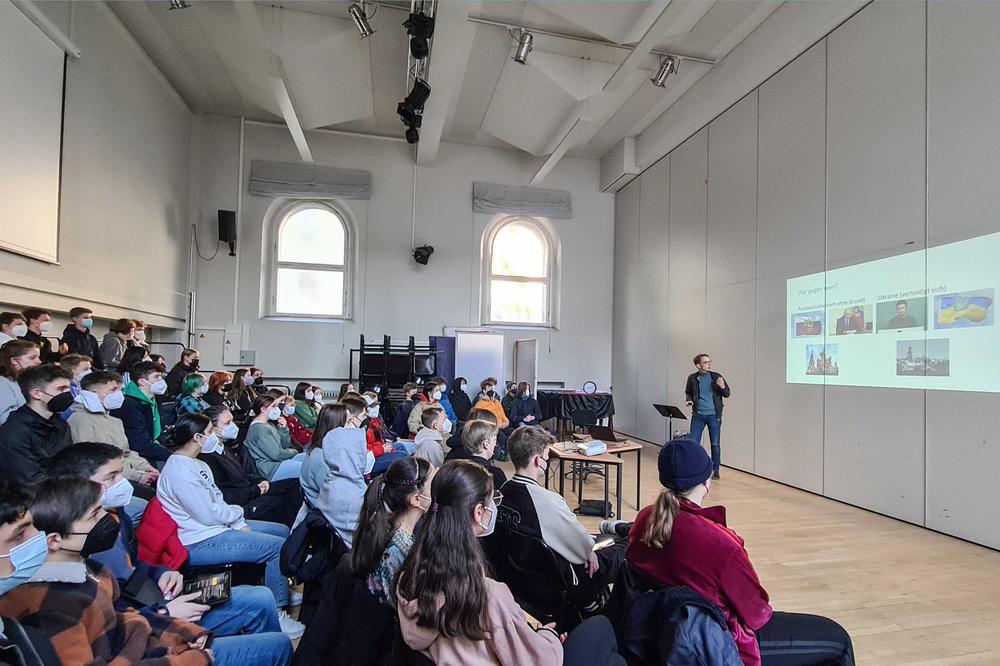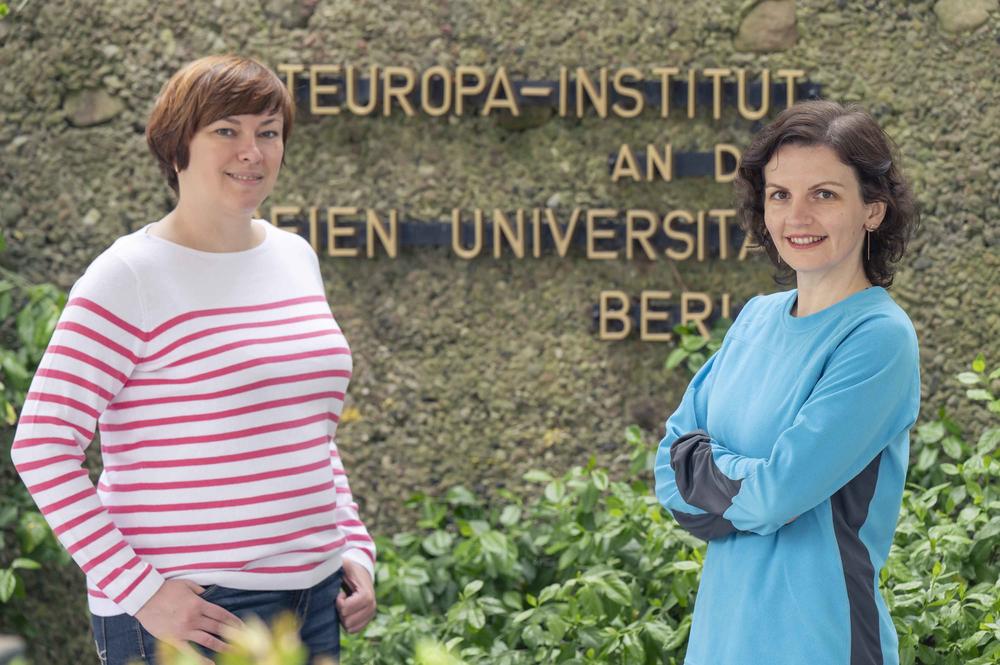Academic Bridges
For decades the Institute for East European Studies at Freie Universität has had close ties to Ukraine through exchange programs and research projects. They have a great desire to help.
Jun 16, 2022
Historian Robert Kindler from the Institute for East European Studies visited a 7th grade class in Kreuzberg. He gave them information to help them better understand the political situation.
Image Credit: Thorsten Frauenkron
When Tamara Martsenyuk holds her online seminar, around 30 students currently dial in. There are 85 students enrolled in the course. “I don’t know what happened to the others,” she says. Martsenyuk is an associate professor of sociology and gender studies who teaches at the University of Kyiv-Mohyla Academy in the Ukrainian capital of Kyiv. “I hope the problem is that they do not have stable internet access right now, but...” She swallows and does not finish the sentence.
Martsenyuk fled to Berlin in early March and is safe, but many of her students are still in Ukraine. A bridging scholarship from the Institute for East European Studies (OEI) at Freie Universität makes it possible for the sociologist to hold her seminar from a desk in Berlin. It is intended to help endangered researchers from Ukraine, Russia, and Belarus by giving them time: three to six months to submit applications for third-party funding or to apply for other scholarships or fellowships. Time to continue supporting students despite the war.
Most Appeals for Help Come from Russia and Belarus
Freie Universität launched the call for the scholarship on March 18. Mihai Varga, who holds a doctorate in sociology, is a research associate at the OEI and coordinates the receipt of applications. So far, 15 fellowships have been awarded. “The scholarships are particularly important for Ukraine, as they enable colleagues to continue their teaching activities,” says Varga. “We do not require them to teach with us, so they can focus on activities at their universities.”
However, Varga notes that most inquiries come from Belarus and Russia. Unlike Ukrainian applicants, those who apply from there must demonstrate that they are in danger in their own country. After the outbreak of war, many Russian university administrations declared that they supported the Russian attack on Ukraine.
Relations with Academic Institutions in Russia Suspended
In February, Freie Universität suspended its relationships with academic institutions in Russia. “Freie Universität Berlin strongly condemns the Russian government’s war,” said the university president Professor Günter M. Ziegler in a speech that is available as a video recording on Freie Universität’s website. The liaison offices of Freie Universität Berlin in Moscow and Saint Petersburg have been closed, and all research collaborations and financial transfers have been suspended.
Student exchanges and the strategic partnership with Saint Petersburg State University have also been put on hold. With this move, Freie Universität is interrupting a tradition of academic exchange with Russian institutions extending over decades. However, individuals remain welcome at Freie Universität, regardless of their origin.
As early as 1968, the Institute for East European Studies, which was still quite new at the time, concluded an exchange agreement with the State University of Saint Petersburg, then called Zhdanov University in Leningrad. Since then, students from Berlin have traveled to Russia year after year to experience Russian studies first hand.
Tamara Martsenyuk (right), a professor of sociology and gender studies, has a fellowship from the Institute for East European Studies. Tetiana Kostiuchenko, a sociology lecturer, has a fellowship set up by the SCRIPTS Cluster of Excellence.
Image Credit: Bernd Wannenmacher
“Days of Ukraine” Marked the 70th Anniversary of the Institute for East European Studies
Freie Universität also maintains close partnerships with Ukraine. In September 2021, a two-day conference “Days of Ukraine” took place in Dahlem. It marked the occasion of the 70th anniversary of the Institute for East European Studies and the 30th year of Ukraine’s independence. Researchers from Berlin, Brandenburg, and Ukraine were able to meet and further extend their collaboration.
Freie Universität has partnerships with the universities in Kyiv, Odessa, and Lviv within the mobility network Erasmus+ of the European Union. Freie Universität cooperates with the National Mechnikov University in Odessa via the Leonhard Euler Program of the German Academic Exchange Service. The program supports binational research projects with funds from the German Federal Foreign Office. Collaboration between Freie Universität Berlin and the Kyiv School of Economics and the Institute for International Relations at the Taras Shevchenko University in Kyiv was formalized in a joint declaration of intent.
Teachers Visit Schools in Berlin and Brandenburg
Another project was started in March. Together with historians from the Leibniz Centre for Contemporary History (Leibniz-Zentrum für Zeithistorische Forschung Potsdam e. V., ZZF), teachers from the Institute for East European Studies have visited more than 60 school classes in Berlin and Brandenburg. They talk with young people from seventh grade on about the Soviet Union and East-Central Europe after the Iron Curtain, providing them with historical background about the current war. They also hold training sessions for high school teachers.
One of the participating scholars is Robert Kindler, a visiting professor of history at the OEI. Kindler said, “The idea came up spontaneously at our institute because there was a great need for information on all sides. Since the ZZF had just started such the project, we were happy to get involved.” When Kindler visited the schools, he was impressed by the depth of knowledge of the students and the degree to which they had already dealt with the topic. “Their questions were very thoughtful and went far beyond the headlines in the media,” he said.
High School Students in Berlin Asked Intelligent Questions about the War
One of the classes that Kindler attended was Thorsten Frauenkron’s ninth grade. Frauenkron teaches philosophy and German at the Leibniz-Gymnasium in Kreuzberg’s Bergmannkiez neighborhood and was one of the first to ask for someone to speak with his students. Frauenkron says, “The event was extremely worthwhile. After it was over the children were no longer afraid of the war because they could understand it better.” His students had so many intelligent questions that the double lesson with Kindler was hardly enough. Frauenkron said he also learned a lot from the conversation. “In class we talked a great deal about the children’s concerns. I wasn’t able to answer a lot of the questions myself, so the conversation was the perfect starting point.”
Tamara Martsenyuk, the professor from Kyiv, has also been answering many questions since her arrival in Berlin. She speaks to media editors in different countries every day. She also writes specialist articles, takes part in demonstrations, attends academic events, and prepares seminars and lectures. She would like to talk more about her research, Ukraine, and her anger at Russia, but she is on her way to a demo. The main thing is to do something.
Fellowships Provide More than Just Financial Assistance
“Thinking about the war makes me infinitely sad,” says Martsenyuk. “It’s easier not to think about it when I work all the time.” In that regard the fellowship provides much more than financial assistance. She continues, “I can do a lot more here in Germany than in Kyiv. Here I am able to work and make my contribution instead of having to watch idly as my country is destroyed.” Her brother and her parents, who all work in hospitals, stayed in Ukraine. In the few free minutes that she allows herself, Martsenyuk thinks of her family and her students, especially concerned about those who no longer dial into the online seminar.
This article originally appeared in German on May 8, 2022, in the Tagesspiegel newspaper supplement published by Freie Universität Berlin.


